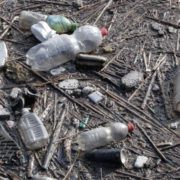Amsterdam, 19 February 2019 – Last year in April, the Dutch publishing house LIAS published, in cooperation with the Plastic Soup Foundation, the Plastic Soup Atlas of the World. Maria Westerbos, director of the Plastic Soup Foundation, presented on Malta the first copy to Karmenu Vella, the European Commissioner for the environment. This book, written for a wide audience, deals with all aspects of plastic soup and has attracted a lot of interest. In the beginning of this year a second Dutch edition came out, and the atlas has found its way into schools as an educational tool.
The publishing house LIAS sold the rights of the book to Japan, Italy, and the global English rights to the USA. The American publisher Island Press will issue a new English edition: Plastic Soup. An Atlas of Ocean Pollution on 4 April 2019.
This English world edition will be published in the USA, Australia and the UK. It has a new cover and is two inches smaller than the current atlas-sized edition. It made the The Independent’s selection of the nine best plastic-free books and NewSouth Books, an Australian bookstore, placed the book on its list of April’s new lead titles.
But this is not the end of the international success of the book. Later this year Poplar Publishing will issue a Japanese edition and Edizioni Ambiente the Italian edition.
Rebecca Bright, Island Press editor: “Ocean pollution is a critical global issue, and this beautiful book is a resource and an inspiration for those looking for creative solutions. We’re proud to publish this edition of Plastic Soup and bring it to English-speaking readers around the world.”
Order here via Bol.com:
Also read: European Commissioner Vella Receives the first copy of the plastic soup atlas of the world





